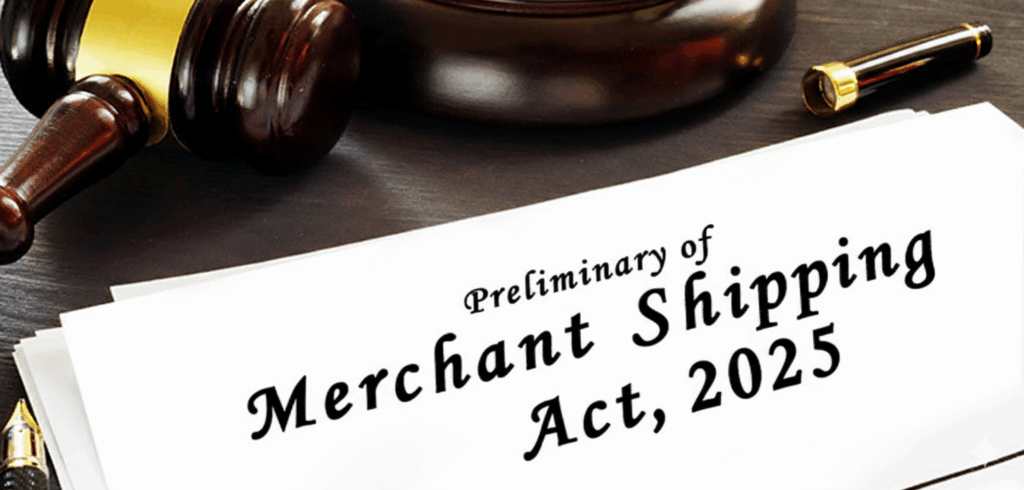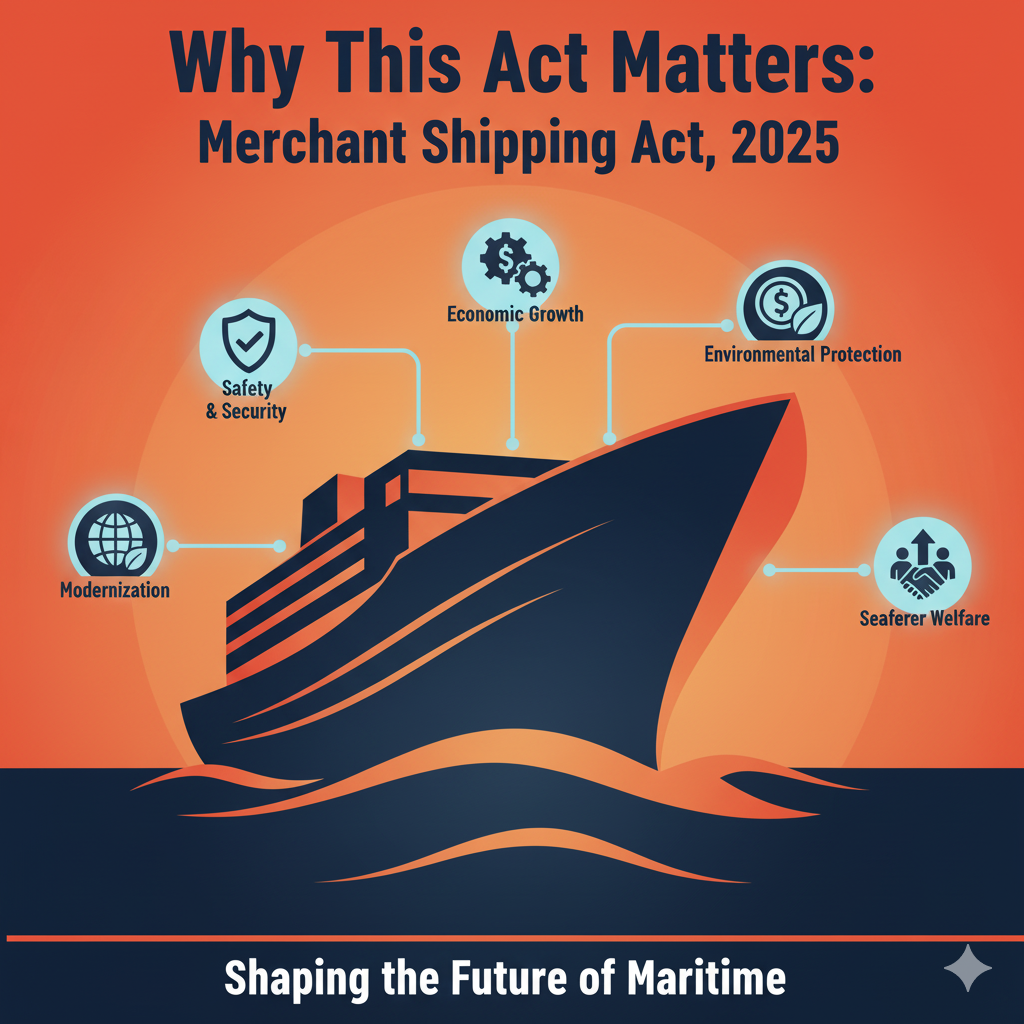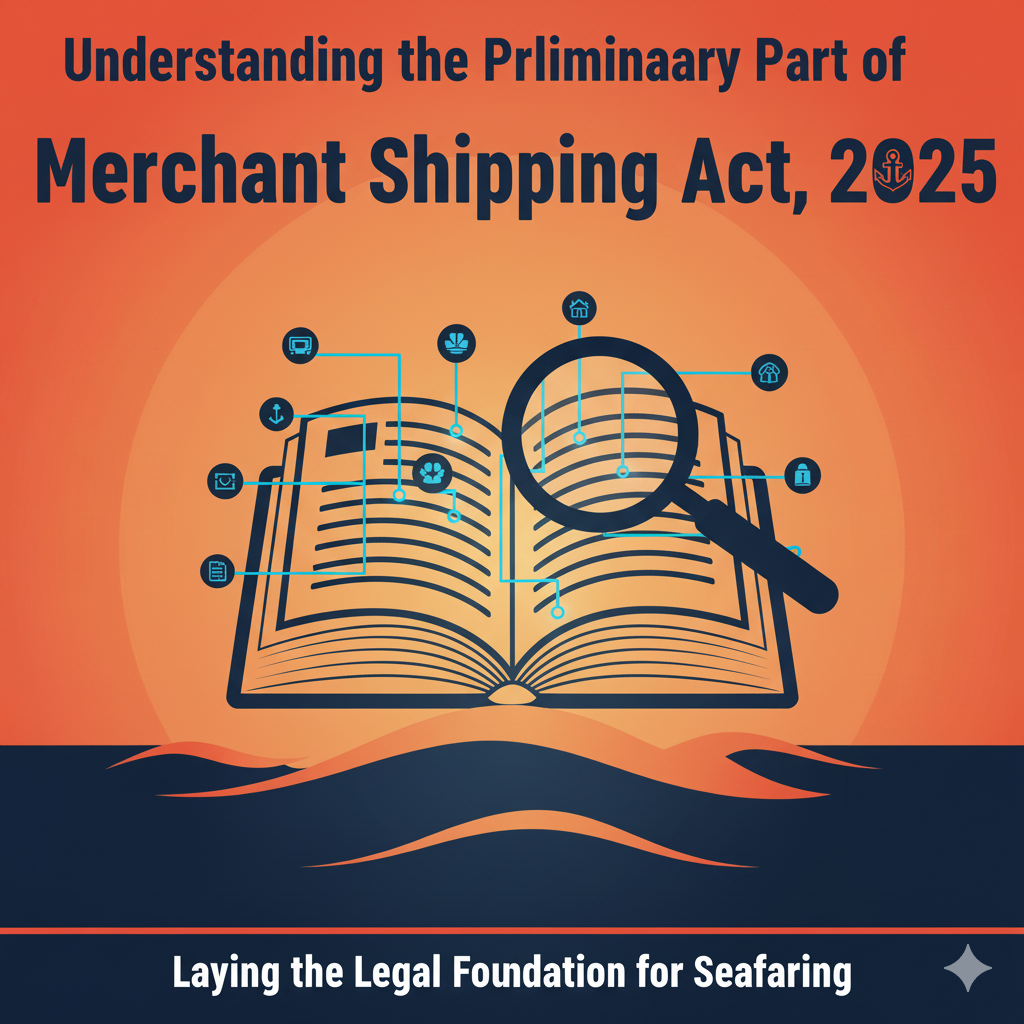The Merchant Shipping Act, 2025 sets the foundation for a new set of rules and revised acts. On the 18th of September 2025 the MINISTRY OF LAW AND JUSTICE (Legislative Department) rolled out a new act regarding shipping industry after receiving the assent of the President and hereby publishing it for general information. But before we dive further into all the sections, we will have to establish and understand the preliminary part of this act to better follow, perform and act according to the new set of rules.

In this blog today we will see and learn about:
Table of Contents
Purpose of the Act
The act has been introduced:
- To consolidate and update all previous laws related to merchant shipping in India.
- To ensure compliance with international treaties and conventions such as MARPOL, SOLAS, and STCW.
- To promote the growth of the Indian shipping industry and maintain an efficient Indian mercantile marine.
- To serve the national interest while balancing the welfare of vessels and seafarers at the same time.
While the government of india is rolling out these acts to better the maritime industry the directorate general of shipping are taking several steps further to ensure the safety of seafarers by issuing drafts for guidelines for empanelment and retention of salvors and making medical tests for seafarers compulsory.
Commencement of the Merchant Shipping Act 2025
- The official name of this act is to be the Merchant Shipping Act, 2025.
- The Central Government will decide when it comes into effect after careful considerations.
- Different sections of the Act may be enforced on different dates, allowing for a phased rollout.
Who is this for and who will it effect
The act applies to a wide range of :
- All Indian vessels.
- Vessels required to be registered in India (regardless of where they operate).
For foreign vessels, the Act applies only while they are within Indian waters or coastal zones. However, Indian owned ships registered abroad (called Indian controlled tonnage vessels) are largely exempt, unless specifically mentioned.
Along with registering your vessels into the maritime industry through DG shipping you can also register your maritime consultancy firm and get RPSL license without going through the tedious process of extensive research. Its important to take this step through verified sources because DG shipping recently released a critical directive aimed at eliminating fake maritime certifications and strengthening the standards of crew training under international maritime conventions.
Why this section matters

The Preliminary part is like the foundation stone of the Act. It explains why the laws and sections exist, what to do with them in action and defines who, why, where and when these acts affect. It also provides a dictionary of legal terms, ensuring clarity for all further sections.
Some key definitions you need to know:
The act introduces and clarifies several important terms:
- Seafarer – Anyone working onboard a sea-going vessel (excluding military/government ships).
- Abandoned Seafarer – A crew member left without wages, repatriation, or support for at least two months.
- Abandoned Vessel – A vessel deserted by its owner or one where obligations for safety, welfare, or pollution prevention are not met.
- Vessel – Broad definition that includes ships, boats, fishing vessels, sailing vessels, submersibles, offshore units, and more.
- Ship Owner – Includes the registered owner and bareboat charterer.
- Passenger / Passenger Vessel – Anyone traveling onboard except crew, rescued persons, or infants under one year.
- Director General of Maritime Administration – The central authority responsible for implementing the Act.
- Conventions – Refers to global maritime treaties India is bound by, such as MARPOL (pollution prevention), SOLAS (safety), and STCW (training & certification).
- Pollution Damage – Loss, environmental harm, or costs caused by oil, cargo, or other discharges from a ship.
- Wreck – A stranded, sunken, or derelict ship.
To conclude, the preliminary of this new act rolled out on the 18th of July 2025 sets the tone for the 118 page long document published by the authority of the national shipping administration.
FAQs
- Is this act already implemented?
Yes, the act is in function as on 18th of August 2025 - What is the history behind this act?
India has had multiple of these acts before, the most notable one being The Merchant Shipping Act, 1958, which is a cornerstone of Indian maritime law. It was enacted to consolidate and amend existing laws related to merchant shipping, aiming to foster the development and efficient maintenance of an Indian mercantile marine. - Where does this act matter and what has it done for the shipping industry?
As mentioned before this act aims to foster the development and efficient maintenance of the Indian maritime industry. You can read further into its importance and evaluation here: Merchant Shipping Act – Its intent and purpose - Who does this affect?
The new act affects the vessels in india, registered in india and are passing through indian waters. It also affects the people involved in the shipping industry. Stay tuned for our official blogs that will be expanding on and explaining all the sections of the act. - Full forms and meanings of MARPOL, SOLAS, and STCW
- MARPOL – Marine Pollution is an international convention focused on preventing pollution of the marine environment by ships, covering various types of discharge and accidental pollution.
- SOLAS – Safety of Life at Sea is an essential international treaty setting minimum standards for the construction, equipment, and operation of ships to ensure safety at sea.
- STCW, Standards of Training, Certification and Watchkeeping is an international convention that establishes the qualification standards for masters, officers, and watch personnel on merchant ships.

